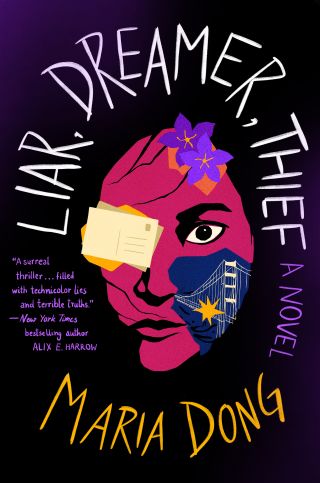Suicide
How Music Can Help Us Heal
First-hand insights and new research on the power of the arts.
Posted February 21, 2023 Reviewed by Ekua Hagan
Key points
- Performing music has been linked to improved mental health in young people.
- Listening to music can help relieve stress.
- Reading literature can help build greater empathy and understanding.

Music can heal us on many levels. Novelist Maria Dong, the author of Liar, Dreamer, Thief, says music was a “lifeline” that has helped her deal with her mental illness (2023a).
Maria began having mental health issues in elementary school which continued to grow through middle school, “one of the most difficult periods of my childhood,” she says. During the many years she has taken prescribed medications, she began experiencing side effects, such as hallucinations, when she began seeing things that weren’t really there. Today, she often pauses to ask herself if what she’s experiencing is real.
Maria says that for Asian Americans, “there's been a big stigma in terms of talking about mental health and negative emotion.” Because of this, many young Asian Americans like herself don’t get the help they need, leading to the high suicide rate in this group. Fortunately, she found comfort in music, which became the main “organizing activity or routine of my entire life.” She began playing the clarinet in middle school, then joined the choir, and also played the guitar. She played the clarinet in band throughout high school, performing complex classical pieces. She even played the trombone during her senior year.
Performing Music as a Healing Intervention
Research has linked performing music with improved mental health for young people (Block et al., 2022) and music has been used in psychotherapy to relieve anxiety, stress, and depression (Hanser, 1985; Maratos, et al., 2008; Wakim, et al, 2010). For years, psychiatrist Roberto Assagioli recommended classical music to help patients regain their emotional balance. New research has associated playing a musical instrument with gains in cognitive ability in people from childhood to late adulthood (Assagioli, 1965; Okely, Overy, & Deary, 2022).
Helping to relieve her social anxiety, performing music for Maria became “a structured way of interacting with people.” She says she’s even made music with people when they didn't have a language in common. Transcending their differences, music became their common language, creating a common bond.
As an example of our human need to create music together, Maria Dong points to the TikTok chain, "a video phenomenon in which musical TikTok users duet their own performance onto songs and rhythms they encounter on the platform. “So you'll have these chains that are five or six or seven people where they're all playing together and they've done it asynchronously.” Even when people were confined to their rooms during COVID, they still found ways to make music together.
Listening to Music as a Healing Intervention
Listening to music can also heal us emotionally, relieving stress and even bringing us into a state of awe (Keltner, 2023). Maria says that in school, music “helped me regulate emotionally. I had these emotional extremes that were really, really difficult and honestly, very painful.” Even now, when she puts on headphones and listens to music, she feels an instant shift in her mood. Today, Maria enjoys listening to all kinds of music, from classical to popular music from the '90s or early 2000s, to classic rock, Korean music, jazz, and the blues.
When she was young, Maria says, music saved her life. Without music, she explains, “I probably would have just killed myself. I was very suicidal. I was deeply sad. And it was very painful. And I felt very alone but when I listen to music, things just don't hurt quite as much.”
The Healing Power of Art

Because of her own experiences, Maria has been fascinated with suicide, and her novel, Liar, Dreamer, Thief, begins with a mysterious suicide when the main character, Katrina Kim, sees a coworker jump off a bridge (2023b). Struggling with her own mental illness, Katrina tries to solve the mystery in a surprising journey that changes her life.
Suicide is always a mystery. Those left behind often wonder “why?” and “what if?” as they try to unravel the causes and motivations. In our own lives, we can wrestle with inexplicable things that happen, but research has shown that reading fiction can increase our understanding of ourselves and one another (Djikic, Oatley, & Moldoveanu, 2013). One of the pleasures of reading a well-crafted mystery is that by the end of the book, the pieces somehow fit together, offering us new insights into our own life as well.
Literature and music are examples of the healing power of art. Whether it’s curling up with a fascinating mystery novel, listening to music, or making music, the arts connect us to a healing process that extends across time, space, and culture.
If you or someone you love is contemplating suicide, seek help immediately. For help 24/7 dial 988 for the National Suicide Prevention Lifeline, or reach out to the Crisis Text Line by texting TALK to 741741. To find a therapist near you, visit the Psychology Today Therapy Directory.
This post is for informational purposes and should not substitute for psychotherapy with a qualified professional. No content is a substitute for consulting with a qualified mental health or health care provider.
© Diane Dreher, Ph.D. 2023 All rights reserved.
References
Assagioli, R. (1965). Psychosynthesis: A manual of principles and techniques. New York, NY: Penguin Books.
Block, E. P., Wong, M.D., Kataoka, S. H., & Zimmerman, F. J. (2022). A symphony within: Frequent participation in performing arts predicts higher positive mental health in young adults. Social Science & Medicine, 292, 114615.
Djikic, M., Oatley, K., & Moldoveanu, M. C.(2013). Reading other minds: Effects of literature on empathy. Scientific Study of Literature, 3 (1), 28-47.
Dong, M. (2023a, February 2). Personal communication. All quotes from Maria Dong are from this source.
Dong, M. (2023b). Liar, Dreamer, Thief. New York, NY: Grand Central Publishing.
Hanser, S. B. (1985). Music therapy and stress reduction research. Journal of Music therapy, 22(4), 193-206.
Keltner, D. (2023). Awe: The new science of everyday wonder and how it can transform your life. New York, NY: Penguin Press.
Maratos, A., Gold, C., Wang, X., & Crawford, M. (2008). Music therapy for depression. Cochrane Database of Systematic Reviews, (1).
Okely, J. A., Overy, K., & Deary, I. J. (2022). Experience of playing a musical instrument and lifetime change in general cognitive ability: Evidence from the Lothian Birth Cohort 1936. Psychological Science, 33 (9), 1495-1508.
Wakim, J. H., Smith, S., & Guinn, C. (2010). The efficacy of music therapy. Journal of Perianesthesia Nursing, 25(4), 226-232.




